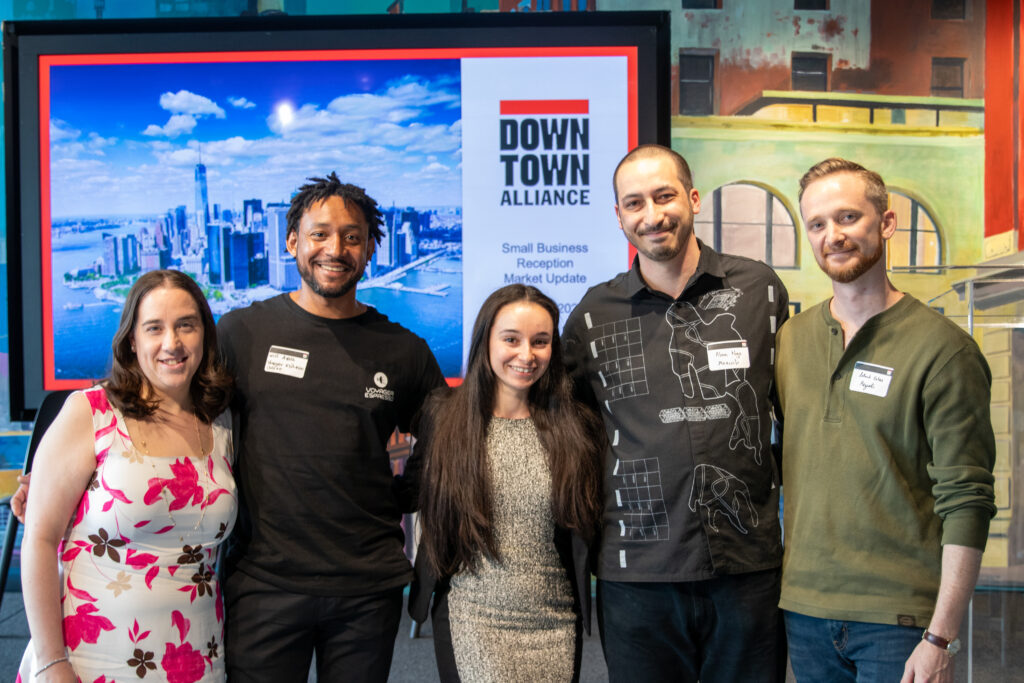
For years, the Downtown Alliance has fielded questions and supplied data for the proprietors among Lower Manhattan, a task that includes being their eyes and ears for the real estate market and providing neighborhood-based research to support small businesses. We provide this information on our site and in our newsletters, but nothing truly beats face-to-face networking. So on Tuesday night the Alliance hosted a reception for local business owners and managers at the Studio inside 7 World Trade Center.
The Alliance’s director of storefront engagement Destany Batista moderated a conversation that focused on local business trends. Panel members included Will Mejia of Voyager Coffee, Alan Ngo and Leland Estes of Mezcali and Eva Busch of Martin Busch Jewelers.
The panel discussed their experiences with surviving the Covid era and dealing with the costs associated with inflation. One anecdote in particular drew a collective gasp from the audience. “I go through $6,000 a week in limes,” Mezcali’s Estes said. “Limes can go up tenfold out of nowhere, and we just have to pay it.”

While the 69-year-old, family-owned Martin Busch Jewelers operates with non-perishable inventory and has a dramatically different set of hours of operation than Mezcali, both Busch’s business and the Lower Manhattan newcomer have the same strategy when it comes to employee retention. They have had to adjust to the times and increase wages, they said, while also understanding the importance of treating staff with dignity. Busch elaborated on how keeping your people happy is essential as well as seeing to their needs whenever possible.
“Anytime someone comes to me for any time off,” Estes added, “they get it immediately.”
With regard to the pandemic, all three businesses endured their own struggles during the supply-chain crises and city shutdowns. But even after the brunt of Covid has passed, business owners say foot traffic and peak business hours are still erratic. The work-from-home additions to office life has thrown off the typical consumer patterns to which Lower Manhattan businesses had grown accustomed over the last several decades.
“You can’t predict the flow with the regularity that you could before,” said Busch, when sharing how to schedule her staff. “We just started opening on Saturdays about 10 years ago, [but now] we started closing on Mondays and extending Saturday hours, because we’re relying on more residents anyway.”
Mejia also said that it was difficult to tell when his commuters would swing by his Fulton Street Station operation for a coffee or sparkling lemonade. “The coffee shop used to be a very constant business,” he said. “One of the biggest challenges is not being able to plan what to have and what to order.”
Overall, though, Busch put a fine point on things when sharing how she and her family have seen the cyclical downturns of the neighborhood that were affected by the attacks on September 11 or Superstorm Sandy. When Covid hit, she recalled, she and her family all thought, This, too, shall pass. “New York is so resilient — there’s always a crop of people that want to live [here],” Busch said. “I’ve seen it with my own eyes. New York always rebounds. People always come back. People always want to be in New York City.”
The business panel was preceded by introductory remarks from Alliance president Jessica Lappin and a presentation from Josh Nachowitz, the Alliance’s senior vice president for economic development. Nachowitz, while conceding that the business owners in the room had a much stronger sense of the weekly goings-on, was able to give a 33,000-foot economic view of Lower Manhattan.
Nachowitz’s presentation can be found here. You can listen to a recording of the panel discussion here.
photos: Ben Ackert


